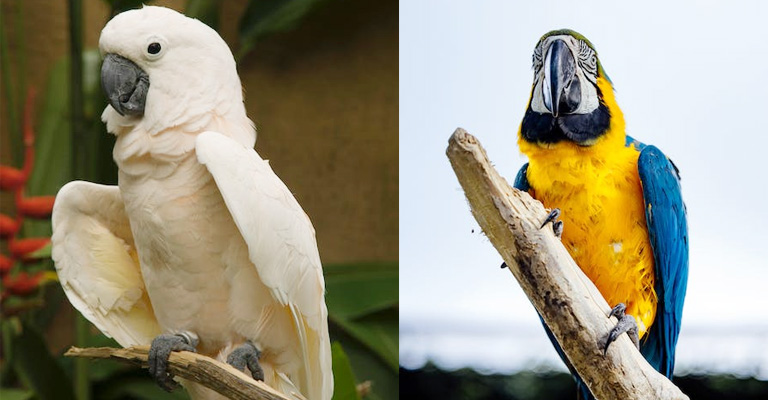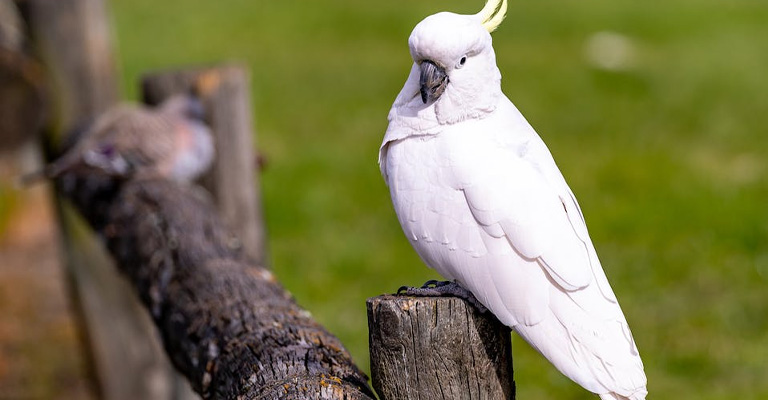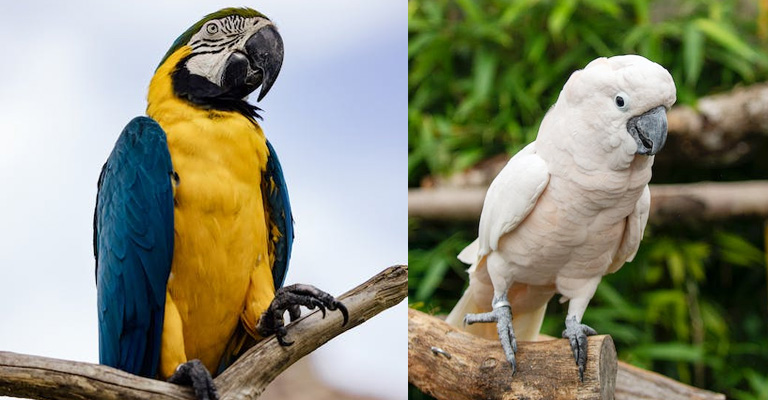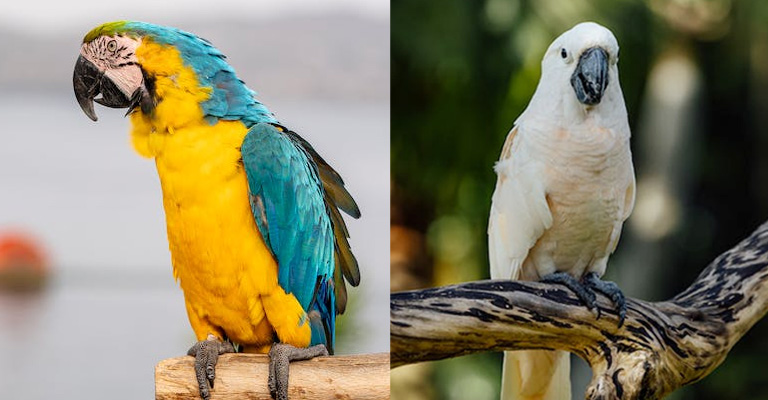Macaws and cockatoos are two of the most captivating and popular bird species in the world. With their striking colors, intelligent personalities, and remarkable vocal abilities, these birds have fascinated bird enthusiasts and pet owners alike.
That’s why people often get confused about these two, especially when they are about to choose one as a pet.
In this article, we will explore the similarities and differences between macaws and cockatoos, shedding light on their distinct characteristics, behaviors, and care requirements.
Whether you’re considering adopting one of these majestic birds or simply curious about their unique traits, this comparison will provide valuable insights into the captivating world of macaws and cockatoos.

What Is a Macaw?
Macaws are known for their impressive size and striking plumage. They belong to the family of New World parrots, and their natural habitat extends from Mexico to Argentina.
Ranging from 30 to 100 centimeters in length, macaws come in various colors, including vibrant blues, radiant yellows, fiery reds, and rich greens. Their large beaks and long, graceful tails contribute to their majestic appearance.
Physical Characteristics and Species
Macaws exhibit a robust build and strong wings, enabling them to navigate their forest habitats with agility.
Some of the most well-known macaw species include the Scarlet Macaw, Blue-and-Gold Macaw, Green-winged Macaw, and Hyacinth Macaw.
Each species showcases unique color patterns and markings, making them a visual spectacle to behold.
Behavior Traits
Macaws are highly intelligent birds, renowned for their ability to mimic human speech and learn complex tasks. They possess an inquisitive nature, constantly exploring their surroundings and engaging in playful behaviors.
Macaws are social creatures, often forming strong bonds with their human companions. They thrive on interaction, mental stimulation, and socialization, requiring ample time and attention from their owners.
Potential Challenges of Owning a Macaw
It is essential to consider the potential challenges associated with owning a macaw. One prominent aspect is their vocalization.
Macaws are known for their loud calls, which can be a source of disturbance for individuals living in close quarters or noise-sensitive environments.
Additionally, macaws require significant living space due to their size and need for physical exercise. Providing a spacious and enriching environment is crucial to their overall well-being.
Lifespan and Long-term Commitment
Macaws are known for their long lifespans, often living for several decades. Some species can live up to 60-80 years or more with proper care and nutrition.
The extended commitment required when owning a macaw should not be underestimated. Providing a macaw with a nurturing and stimulating environment, a balanced diet, regular veterinary care, and ample social interaction is necessary for their physical and emotional well-being throughout their lifetime.
By understanding the physical characteristics, behavior traits, challenges, and long-term commitment involved in owning a macaw, potential owners can make an informed decision about whether a macaw is the right fit for their lifestyle and capabilities.
Proper preparation and dedication are essential to providing these magnificent birds with a fulfilling and enriched life in captivity.
What Is a Cockatoo?

Cockatoos are a diverse group of parrots that are native to Australia, Indonesia, and surrounding regions in Asia. They belong to the family of Old World parrots and are known for their distinctive crests, expressive eyes, and robust beaks.
Cockatoos come in various sizes, with some species reaching lengths of up to 50 centimeters. Their plumage exhibits an array of colors, including whites, pinks, grays, and blacks.
Physical Characteristics and Species
Cockatoo species display unique physical characteristics that distinguish them from one another. Some well-known species include the Sulphur-crested Cockatoo, Umbrella Cockatoo, Major Mitchell’s Cockatoo, and Moluccan Cockatoo.
Each species possesses distinct plumage patterns, crest shapes, and beak sizes, contributing to their individual charm and appeal.
Behavioral Traits
Cockatoos are renowned for their sociable and affectionate nature. They thrive on social interaction and form strong bonds with their human companions.
Cockatoos require significant attention and mental stimulation to prevent boredom and potential behavioral issues.
However, it’s important to note that some cockatoos, especially when not properly socialized or given adequate attention, may display aggressive tendencies or develop behavioral problems.
Care Requirements
Caring for a cockatoo involves meeting its specific needs. Cockatoos require a balanced diet that consists of a variety of fresh fruits, vegetables, high-quality pellets, and occasional nuts and seeds.
Mental stimulation is crucial for their well-being, which can be achieved through interactive toys, foraging opportunities, and regular social interaction.
Grooming needs include regular bathing and nail trims to maintain optimal health and hygiene.
Lifespan and Considerations for Long-term Commitment
Cockatoos are long-lived birds, often surpassing several decades in captivity. Some species can live up to 70 years or more with proper care.
Potential owners must consider the long-term commitment involved in providing a suitable environment, regular veterinary care, and ongoing social interaction throughout the bird’s life.
Cockatoos thrive when they receive consistent love, attention, and mental stimulation, making it essential to ensure the ability to meet these requirements before welcoming a cockatoo into one’s life.
Comparison: Macaws Vs. Cockatoos

There are several factors we can discuss while comparing these two bird groups. I’ve pointed out those facts separately so that you can understand them well.
Size and Physical Differences
Macaws are generally larger than cockatoos, with some macaw species reaching up to a meter in length. They have impressive wingspans and robust beaks.
In contrast, cockatoos are medium-sized parrots, typically smaller than macaws, but still possessing a sturdy build and characteristic crests.
Understanding the size and physical differences is important for providing appropriate housing and meeting their space requirements.
Vocalization and Noise Levels
Both macaws and cockatoos are known for their vocal abilities. Macaws can produce loud calls, which may be a consideration for individuals with noise-sensitive living situations.
Cockatoos, on the other hand, can also be vocal but may exhibit variations in noise levels among different species. Assessing one’s tolerance for loud calls and ability to manage potential noise is crucial in making the right choice.
Social Needs and Bonding Tendencies
Cockatoos are generally social birds and have a tendency to bond closely with their owners. They thrive on companionship and interaction and may require more attention and socialization.
Macaws, while also social, may be more tolerant of interacting with multiple people and can form bonds with different family members.
Understanding the social needs and bonding tendencies of each species will help potential owners gauge their ability to meet these requirements.
Behavior Patterns and Body Language
Macaws and cockatoos exhibit different behavior patterns and body language cues. Macaws are often considered more predictable in their body language, while cockatoos can display sudden aggressive behaviors without apparent warning.
Being able to interpret and understand their body language is essential for maintaining a harmonious relationship and preventing potential issues.
Care Difficulty and the Level of Commitment
Both macaws and cockatoos require specialized care and attention. They need spacious living areas, a balanced diet, regular veterinary care, mental and physical stimulation, and social interaction.
Neither species is considered easy to care for, and both demand significant time and effort from their owners.
Understanding the care difficulty and long-term commitment involved will help potential owners assess their ability to provide for the specific needs of each species.
Factors to Consider When Choosing

If you have understood the differences, you must be thinking about which one to choose as a pet, right? If yes, you should check out the following facts and consider them well before you choose one.
Personal Preferences
Consider your lifestyle and daily routines. Are you an active individual who can provide ample time for interaction and mental stimulation? Assess your living situation, including the type of residence, neighbors, and noise tolerance.
Some species of macaws and cockatoos are louder than others, so it is crucial to match your preferences with the bird’s needs.
Willingness to Invest Time and Effort in Their Care
Evaluate your experience with parrots or other birds. Are you familiar with their care requirements, behavior, and potential challenges?
Parrots, including macaws and cockatoos, require dedicated care, including proper nutrition, regular veterinary check-ups, mental stimulation, and socialization.
Assess your willingness to invest time, effort, and resources in providing a suitable environment for your chosen bird.
Family Dynamics and the Ability
Consider your family dynamics and the presence of children or other pets in the household. Some birds may be more tolerant of multiple people or other animals, while others may prefer a quieter environment.
Assess your ability to provide social interaction and companionship that meets the bird’s social needs, as well as the ability of all family members to safely interact with the chosen species.
Available Space and Living Arrangements
Evaluate the available space in your home for a large bird enclosure and free-flight activities. Macaws and cockatoos require spacious living areas to exercise and explore.
Consider the living arrangements, including potential cage placement, potential hazards, and the ability to create a stimulating environment for the bird’s well-being.
Long-term Commitment and Lifespan
Macaws and cockatoos have long lifespans, often living for several decades. Understand the level of commitment required to care for a bird that can potentially outlive you.
Assess your ability to provide a stable and loving environment for the entire lifespan of the bird, which may involve making arrangements for their care in the event of your absence or passing.
By considering personal preferences, experience, family dynamics, available space, and the long-term commitment involved, you can make an informed decision about whether a macaw or a cockatoo is the right choice for you.
It is crucial to match your capabilities and resources with the needs and requirements of the chosen bird to ensure a harmonious and fulfilling relationship for both you and your feathery companion.
20 Differences At a Glance: Macaws Vs. Cockatoos
| Category | Macaws | Cockatoos |
| Size | Generally larger | Medium-sized |
| Physical Appearance | Vibrant colors, long tails | Crests, a variety of plumage colors |
| Native Region | Central and South America | Australia and Asia |
| Vocalization | Loud calls | Variable noise levels |
| Sociability | Tolerant of multiple people | Bond closely with owners |
| Body Language | Relatively predictable | Sudden aggressive behaviors |
| Diet | Fruits, nuts, seeds | A balanced diet including pellets |
| Space Requirements | Need spacious living areas | Require ample space to exercise |
| Intelligence | Highly intelligent | Intelligent and inquisitive |
| Playfulness | Engage in playful behaviors | Display playful tendencies |
| Aggression | Generally less aggressive | Potential for aggression issues |
| Lifespan | Up to several decades | Up to several decades |
| Social Interaction | Tolerant of multiple people | Prefer focused bonding |
| Noise Tolerance | May require noise control | May tolerate noise to some extent |
| Care Difficulty | Require specialized care | Require specialized care |
| Bonding Tendencies | May bond with family members | Bond closely with owners |
| Physical Challenges | Strong beaks and wings | Distinctive crest and beak |
| Grooming | Regular bathing and grooming | Regular bathing and grooming |
| Family Dynamics | Need social interaction | Require social interaction |
| Long-term Commitment | Lifelong commitment | Lifelong commitment |
FAQs
Yes, both macaws and cockatoos are highly intelligent birds and can be trained to perform various tricks and behaviors through positive reinforcement training methods.
Training requires patience, consistency, and a strong bond between the bird and the trainer.
Yes, both macaws and cockatoos need spacious enclosures that allow them to move around, stretch their wings, and engage in natural behaviors.
The cage should be made of sturdy materials, have appropriate bar spacing, and include various perches, toys, and enrichment items to keep them mentally stimulated.
Macaws and cockatoos are social birds and can benefit from the companionship of their own species. While it is possible to keep them in pairs or groups, careful introductions and monitoring are necessary to ensure compatibility and prevent aggression.
It’s important to note that individual bird personalities can vary, and not all birds will get along.
Both macaws and cockatoos are susceptible to certain health issues, including feather plucking, beak and feather disease, respiratory problems, and nutritional deficiencies.
Regular veterinary check-ups, a balanced diet, and providing a clean and enriched environment are essential for maintaining their overall health and well-being.
Macaws and cockatoos are known for their vocalizations and can produce loud calls. While noise levels can vary among individuals and species, both can be quite vocal.
It’s important to consider noise tolerance and the potential impact on neighbors or household members when choosing to keep these birds.
Due to their large size, high activity levels, and potential noise levels, keeping macaws and cockatoos in apartments or small living spaces may not be ideal.
These birds require ample space to move, exercise, and explore. It is recommended to provide them with a suitable environment that meets their needs and allows for mental and physical stimulation.
Macaws and cockatoos have specific dietary requirements. Their diet should consist of a variety of fresh fruits, vegetables, high-quality pellets, and occasional nuts and seeds.
It is important to offer a balanced and nutritious diet to ensure their overall health and prevent nutritional deficiencies.
Conclusion
You need to consider the criteria of these two birds and also prioritize your preference while choosing one for your pet. Both macaws and cockatoos are extraordinary bird species with their own distinct features and qualities.
Macaws are renowned for their vibrant plumage, strong beaks, and exceptional flying abilities. They are known for their intelligence, playful nature, and their incredible vocalizations.
Cockatoos, on the other hand, are cherished for their charming personalities, affectionate nature, and remarkable mimicry skills. They are characterized by their distinctive crests, cuddly demeanor, and unique feather textures.
Hopefully, this content will help you understand the facts of these two species well. Thank you for your time.